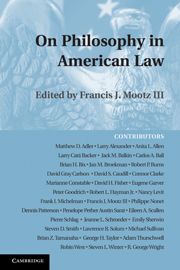Book contents
- Frontmatter
- Contents
- Introduction
- PART I KARL LLEWELLYN AND THE COURSE OF PHILOSOPHY IN AMERICAN LAW
- 1 On Philosophy in American Law (1934)
- 2 Law in Life, Life in Law: Llewellyn's Legal Realism Revisited
- 3 On Realism's Own “Hangover” of Natural Law Philosophy: Llewellyn Avec Dooyeweerd
- 4 On the Instrumental View of Law in American Legal Culture
- 5 When Things Went Terribly, Terribly Wrong
- 6 The Mechanics of Perfection: Philosophy, Theology, and the Foundations of American Law
- PART II PHILOSOPHICAL PERSPECTIVES ON LAW
- PART III AREAS OF PHILOSOPHY AND THEIR RELATIONSHIP TO LAW
- PART IV PHILOSOPHICAL EXAMINATIONS OF LEGAL ISSUES
- PART V LAW, RHETORIC, AND PRACTICE THEORY
- PART VI QUESTIONING THE RELATIONSHIP BETWEEN PHILOSOPHY AND AMERICAN LAW
- PART VII COMMENTARIES
- Contributors and Selected Bibliography
- Name Index
- References
2 - Law in Life, Life in Law: Llewellyn's Legal Realism Revisited
Published online by Cambridge University Press: 31 July 2009
- Frontmatter
- Contents
- Introduction
- PART I KARL LLEWELLYN AND THE COURSE OF PHILOSOPHY IN AMERICAN LAW
- 1 On Philosophy in American Law (1934)
- 2 Law in Life, Life in Law: Llewellyn's Legal Realism Revisited
- 3 On Realism's Own “Hangover” of Natural Law Philosophy: Llewellyn Avec Dooyeweerd
- 4 On the Instrumental View of Law in American Legal Culture
- 5 When Things Went Terribly, Terribly Wrong
- 6 The Mechanics of Perfection: Philosophy, Theology, and the Foundations of American Law
- PART II PHILOSOPHICAL PERSPECTIVES ON LAW
- PART III AREAS OF PHILOSOPHY AND THEIR RELATIONSHIP TO LAW
- PART IV PHILOSOPHICAL EXAMINATIONS OF LEGAL ISSUES
- PART V LAW, RHETORIC, AND PRACTICE THEORY
- PART VI QUESTIONING THE RELATIONSHIP BETWEEN PHILOSOPHY AND AMERICAN LAW
- PART VII COMMENTARIES
- Contributors and Selected Bibliography
- Name Index
- References
Summary
When the philosophies die, the books do not die with them, he writes. He ardently desires to live a full life, which for him is a life of action that is not hampered by theories that do not serve anyone's needs. Consequently, his life is not focused on “verbalized philosophies” that can be found in law books or philosophy books but rather on “philosophies-in-action as the history of law in these United States has gone its way” (Llewellyn 1934: 206). What ideas are implied in Karl Llewellyn's approach, and do they remain relevant for us today?
TWO BIOGRAPHIES, AMONG OTHERS
Revitalizing a life as it is – a realm of immediate experiences – requires one to eschew ossified concepts, prescribed linguistic patterns, and institutionally safeguarded expressiveness. This guiding idea leads Llewellyn to use law and philosophy as catchwords rather than as precise descriptions of this important contrast. Indeed, the entire essay On Philosophy in American Law operates as a catchword. Perhaps the central catchword lurking in this essay is life, and to explore the complex dimensions of this catchword we can turn to two biographical notes on Llewellyn that point toward a very different development.
In his well-known book, Fikentscher (1975: 285) explains
Llewellyn's oeuvre becomes more understandable if one looks at his way in life. Born 1893 in a German-English-Irish family of the Middle West, the parents had educational problems with the young man, so that he was handed over to a stern uncle in Eastern Prussia. Due to an administrative error in the beginning of the First World War, he had to perform active military service in the German army. […]
- Type
- Chapter
- Information
- On Philosophy in American Law , pp. 11 - 18Publisher: Cambridge University PressPrint publication year: 2009



